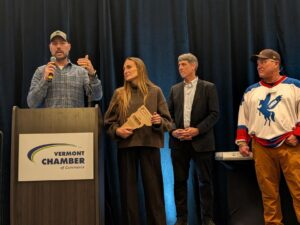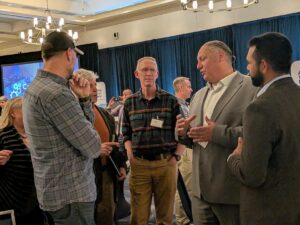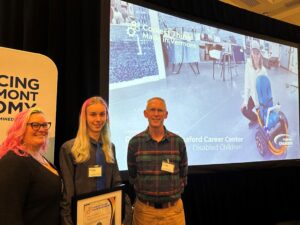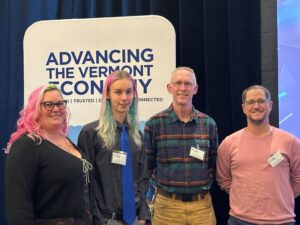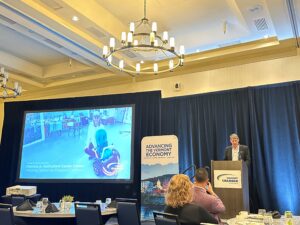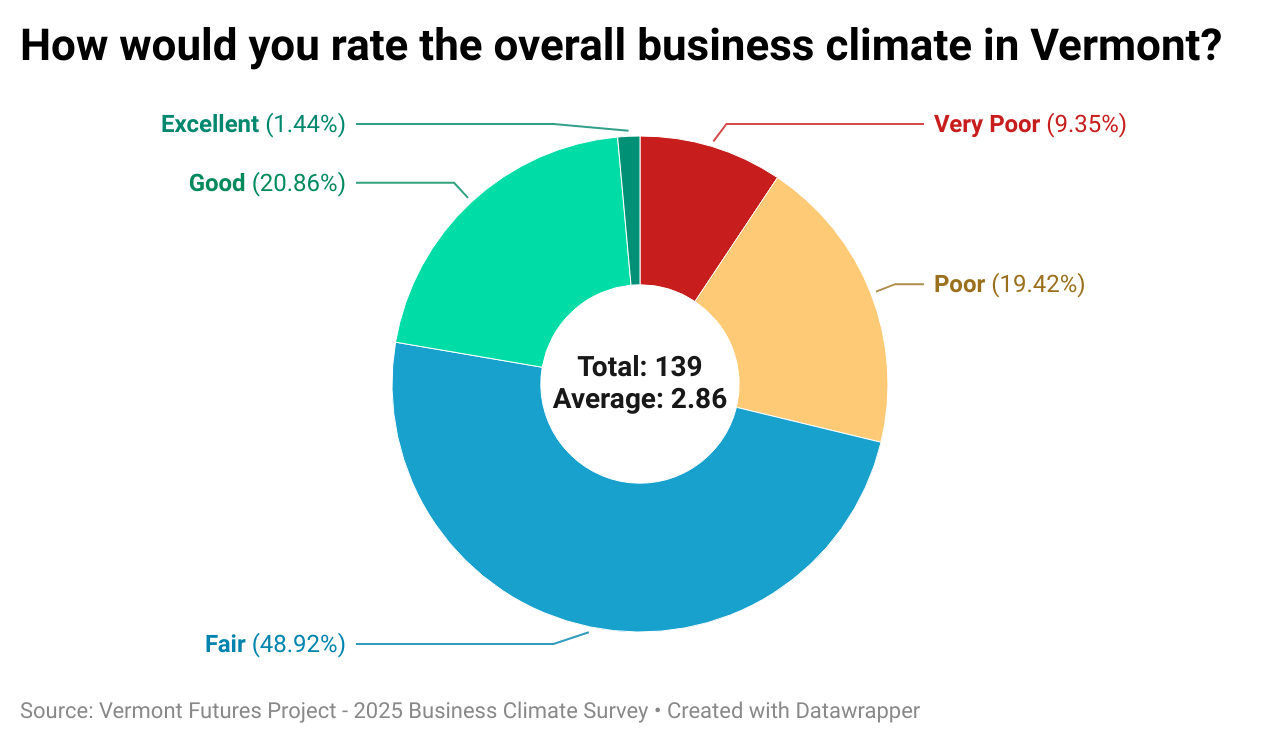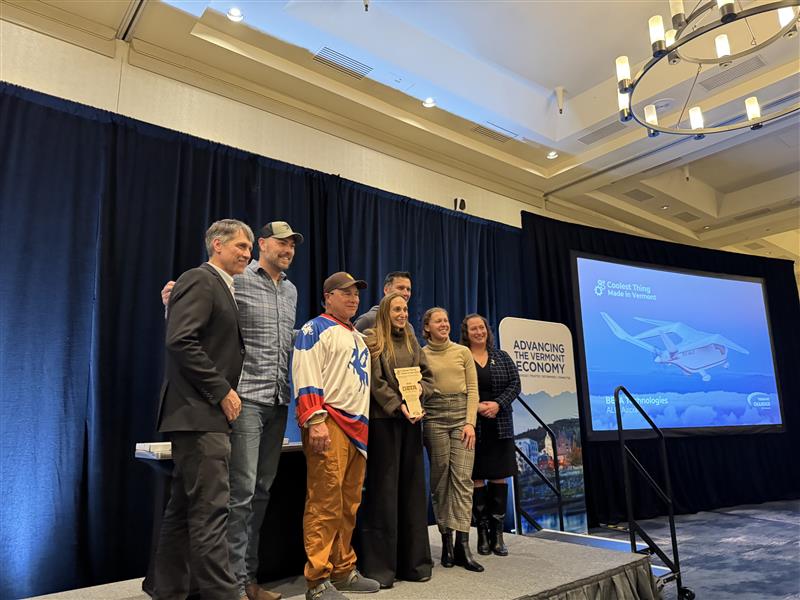Vermont Chamber Announces Winners of the Coolest Thing Made in Vermont Awards
BETA Technologies’ ALIA Aircraft and Hannaford Career Center’s Tiny House on Wheels Named 2025 Winners
The Vermont Chamber of Commerce has announced the winners of the 2025 Coolest Thing Made in Vermont Awards, recognizing the state’s most innovative manufacturers and the next generation of technical talent. The awards were presented during the annual Vermont Manufacturing Summit, the state’s premier gathering for manufacturers from across Vermont, New England, and Canada.
2025 WINNERS
Coolest Thing Made in Vermont
BETA Technologies – ALIA Aircraft: BETA Technologies was selected for its groundbreaking all-electric ALIA aircraft, capable of both conventional takeoff and landing (CTOL) and vertical takeoff and landing (VTOL). Designed and built in Vermont, ALIA represents a fully integrated approach to the future of aviation—from advanced propulsion systems to charging infrastructure. The aircraft embodies BETA’s commitment to safety, sustainability, and innovation, reflecting the global impact of Vermont-grown manufacturing excellence.
“On behalf of our nine hundred plus member team at BETA, we are completely humbled to receive this recognition. Thank you. Katie and I grew up here and knew this is where we wanted to build our business. It took twelve years of pitching the idea of BETA before the first person said yes. At that moment, we decided our strategic advantage would be to be highly vertically integrated and to do it as sustainably as possible. These things echo our Vermont advantage. That is the advantage of thinking differently about how we do things and setting the bar high. We are thrilled to be here, doing all of that for electric aviation with our team here in Vermont,” said Kyle Clark, Chief Executive Officer of BETA Technologies.
Coolest Thing Made by a Career Technical Education or STEAM Program
Patricia A. Hannaford Career Center – Tiny House on Wheels: Students from the Patricia A. Hannaford Career Center received top honors for designing and building a fully functional Tiny House on Wheels, crafted to provide affordable housing for a local resident. The project showcases applied learning, craftsmanship, sustainability, and the community-minded spirit that defines Vermont’s Career Technical Education programs.
“This event highlights the power of CTE in the lives of students, and the importance of CTE for Vermont. The innovation of these kids demonstrates what young people can do when given access to Career Technical Education. CTE is not just a leg up for their future goals, it is a launchpad,” said Nicole MacTavish, Ed.D., Superintendent and Director of the Patricia A. Hannaford Regional Technical School District.
More than sixty submissions were entered by manufacturers and student teams across the state, an impressive reflection of the innovation, creativity, and technical skill that fuel Vermont’s manufacturing sector. From aerospace and advanced engineering to adaptive technology and community driven housing solutions, this year’s entries highlight the sector’s powerful contributions to Vermont’s economic vitality.
“The Vermont Chamber is proud to champion Vermont’s manufacturers, industries that make living, working, and thriving in Vermont possible,” said Amy Spear, President of the Vermont Chamber of Commerce. “The Coolest Thing awards celebrate not only remarkable products, but the skilled workforce, ingenuity, and partnerships that strengthen Vermont’s economy. We are honored to recognize the leaders and students who are shaping the future of manufacturing in our state.”
FINALISTS (HONORABLE RECOGNITION)
Made in Vermont Finalists
- Rothspeed – Splitray Supercar: A carbon-fiber reimagining of a vintage Corvette, blending classic design with advanced engineering. Built in Milton, the Splitray showcases world-class performance and the artistry of Vermont’s precision manufacturing.
- WheelPad L3C – SuitePAD: A 200-square-foot modular bedroom and bathroom suite that can be attached to an existing home in weeks, providing accessible, dignified housing for those facing mobility challenges. SuitePAD reflects the power of design, compassion, and rural economic resilience.
Career Technical Education or STEAM Program Finalists
- Green Mountain Robotics – “Champ”: A competitive 140-pound robot built by FRC Team #9101, demonstrating the strength of Vermont’s growing STEM talent pipeline.
- Lyndon Institute – Bridge Barrier: A custom steel safety barrier fabricated by welding students to protect the historic 1878 Miller’s Run Covered Bridge—an example of applied learning and community stewardship.
- North Country Career Center – Air Blow Off System: A student-engineered automated air system designed to reduce downtime and operational costs for a local manufacturer.
- Patricia A. Hannaford Career Center – Mobility Device for Disabled Children: A student-created adaptive mobility device that transforms a toy car into life-changing technology for a local child.
Celebrating Vermont Manufacturers at the Summit
The Vermont Manufacturing Summit brings together leaders from across the region for two days of global supply-chain matchmaking, policy discussions, workforce innovation, and advanced manufacturing collaboration. The Coolest Thing awards are a cornerstone of the Summit, honoring both the products that strengthen Vermont’s economy today and the students and educators building tomorrow’s workforce.
“Manufacturing is one of Vermont’s most essential economic sectors,” Spear noted. “From aerospace to outdoor recreation to custom fabrication, these employers fuel statewide innovation, create high-wage jobs, and anchor communities. The Summit and the Coolest Thing awards underscore our commitment to supporting this critical sector through advocacy, community, and resources.”


